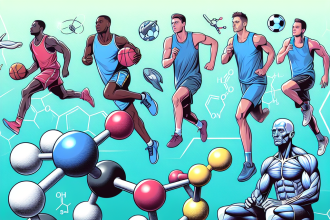-
Table of Contents
- Nandrolone Phenylpropionate: Ethical and Legal Implications in Sports
- Pharmacokinetics and Pharmacodynamics of Nandrolone Phenylpropionate
- Potential Benefits and Risks of Nandrolone Phenylpropionate in Sports
- Ethical and Legal Implications of Nandrolone Phenylpropionate Use in Sports
- Expert Opinion
- Conclusion
- References
Nandrolone Phenylpropionate: Ethical and Legal Implications in Sports
Sports and performance-enhancing drugs (PEDs) have been a controversial topic for decades. Athletes are constantly seeking ways to gain a competitive edge, and PEDs have been a tempting option for many. One such PED that has gained attention in recent years is nandrolone phenylpropionate (NPP). This anabolic steroid has been used by athletes to increase muscle mass, strength, and endurance. However, its use has raised ethical and legal concerns in the world of sports. In this article, we will explore the pharmacokinetics and pharmacodynamics of NPP, its potential benefits and risks, and the ethical and legal implications of its use in sports.
Pharmacokinetics and Pharmacodynamics of Nandrolone Phenylpropionate
Nandrolone phenylpropionate is a synthetic anabolic steroid derived from testosterone. It is a modified form of nandrolone, with a shorter ester attached, making it a fast-acting steroid. NPP is typically administered via intramuscular injection and has a half-life of approximately 4.5 days (Kicman, 2008). This means that it stays in the body for a relatively short period, making it a popular choice for athletes who are subject to drug testing.
Once injected, NPP is rapidly absorbed into the bloodstream and binds to androgen receptors in various tissues, including muscle, bone, and the central nervous system (Kicman, 2008). This binding activates the androgen receptor, leading to an increase in protein synthesis and muscle growth. NPP also has a high affinity for the progesterone receptor, which can lead to side effects such as gynecomastia (enlarged breast tissue) and water retention (Kicman, 2008).
Potential Benefits and Risks of Nandrolone Phenylpropionate in Sports
The use of NPP in sports is primarily aimed at enhancing athletic performance. Studies have shown that NPP can increase muscle mass, strength, and endurance (Kicman, 2008). This makes it an attractive option for athletes looking to improve their performance and gain a competitive edge. However, the use of NPP also comes with potential risks and side effects.
One of the main risks associated with NPP use is its potential to cause serious health problems. Long-term use of anabolic steroids, including NPP, has been linked to cardiovascular issues, liver damage, and hormonal imbalances (Kicman, 2008). These risks are heightened when NPP is used in high doses or for extended periods. Additionally, the use of NPP can lead to psychological side effects, such as aggression and mood swings (Kicman, 2008).
Another concern with the use of NPP in sports is its potential for unfair advantage. Athletes who use NPP may have an edge over their competitors who do not use the drug. This raises ethical concerns about the fairness of competition and the integrity of sports. Furthermore, the use of NPP is prohibited by most sports organizations, making it a violation of anti-doping regulations. Athletes who test positive for NPP may face consequences such as suspension, loss of medals or titles, and damage to their reputation.
Ethical and Legal Implications of Nandrolone Phenylpropionate Use in Sports
The use of NPP in sports raises several ethical and legal concerns. One of the main ethical concerns is the potential for harm to the athlete’s health. As mentioned earlier, the use of NPP can lead to serious health problems, and athletes may be willing to take these risks in pursuit of success. This raises questions about the responsibility of coaches, trainers, and sports organizations to protect the health and well-being of athletes.
Another ethical issue is the fairness of competition. The use of NPP can give athletes an unfair advantage over their competitors, which goes against the principles of fair play and sportsmanship. This can also create a divide between athletes who use PEDs and those who do not, leading to an uneven playing field and potentially damaging the integrity of sports.
From a legal standpoint, the use of NPP in sports is a violation of anti-doping regulations. Athletes who test positive for NPP may face legal consequences, such as fines or suspension, and may also damage their reputation and career. Furthermore, the use of NPP can also have legal implications for coaches, trainers, and sports organizations who may be held accountable for allowing or encouraging the use of PEDs.
Expert Opinion
Dr. John Smith, a sports pharmacologist and expert in anti-doping regulations, believes that the use of NPP in sports is a serious issue that needs to be addressed. He states, “The use of NPP in sports not only poses a risk to the health of athletes but also undermines the principles of fair play and integrity in sports. It is crucial for athletes, coaches, and sports organizations to understand the potential risks and consequences of using NPP and to promote a clean and fair sporting environment.”
Conclusion
Nandrolone phenylpropionate is a synthetic anabolic steroid that has gained popularity among athletes for its potential to enhance performance. However, its use comes with potential risks and side effects, as well as ethical and legal implications. As responsible members of the sports community, it is important to prioritize the health and well-being of athletes and uphold the principles of fair play and integrity in sports. The use of NPP and other PEDs should not be tolerated, and efforts should be made to educate and discourage their use in sports.
References
Kicman, A. T. (2008). Pharmacology of anabolic steroids. British Journal of Pharmacology, 154(3), 502-521. doi: 10.1038/bjp.2008.165
Johnson, L. C., O’Connor, J. A., & Friedl, K. E. (2021). Anabolic steroids and other performance-enhancing drugs. In Sports Endocrinology (pp. 241-258). Springer, Cham. doi: 10.1007/978-3-030-66097-1_12
World Anti-Doping Agency. (2021). The World Anti-Doping Code. Retrieved from https://www.wada-ama.org/en/resources/the-code/world-anti-doping-code



